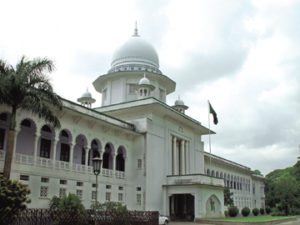Dhaka Times Desk The High Court ruled that the speaker's ruling based on the statement of a judge was 'invalid and without legal basis'.

The bench of Justice Hasan Faiz Siddiqui and Justice ABM Altaf Hossain passed this judgment on July 24 after disposing of a writ petition filed against the validity of the Speaker's ruling. On Monday, August 27, the High Court published the judgment along with its full opinion and instructions. The court, in its opinion, said the speaker's ruling on a judge's alleged violation of the constitution had no legal basis and was non-existent in law. The court also said that the Speaker's opinion has no 'legal effect'.
"The ruling is inconsistent with Article 96 (5) of the Constitution and inconsistent with the Constitution and the Rules of Procedure of Parliament." Speaker Abdul Hamid gave the ruling in Parliament on June 18 in the context of the tension caused by the comments of High Court Division Judge AHM Shamsuddin Chowdhury. On May 29, the debate started around a speech given by the Speaker in Parliament. Requesting a review of a High Court order to the Roads and Highways Department to release the land to the Supreme Court, the Speaker said on the day that people can stand up against the judiciary if they are angry with the court's verdict. Justice Shamsuddin Chowdhury said on June 5 that the Speaker's speech is tantamount to treason. After that there was great tension in the parliament.
Later in the ruling, Abdul Hamid said, "I doubt whether any sane person can utter the comments about the Parliament, about me, in violation of Article 78(1) of the Constitution by an honorable judge of the High Court." Respecting the anger of the members of Parliament, the Speaker expressed hope that the Chief Justice would take action on the judge's unsolicited speech.
However, the High Court, in its judgment which struck down the rule, said that it is the responsibility of the Supreme Court to ensure that no organ of the state violates the limits of its constitutional powers. The 'extent of special rights' depends on the interpretation of Article 78 of the Constitution. The power of this interpretation lies solely within the jurisdiction of the Supreme Court. Parliament cannot claim itself as the final arbiter in determining its special rights. “Article 7 of the Constitution vests sovereign power in the people. The people have determined the limits of the powers of the three organs of the state through the constitution. Parliament is empowered to legislate within the limits of the Constitution.” The court said, the Speaker's ruling does not show that the judge raised any question in his court or in any court challenging any proceedings of the Parliament. The Speaker did not even mention in his ruling that any case challenging the proceedings of the Parliament should be filed or pending. Therefore, the said judge has not committed any violation of Article 78(1) of the Constitution. The court also opined that the proceedings of the Parliament were not challenged in the Roads and Highways Department case.
Reviewing the Rules of Procedure of the Parliament, the court observed in the judgment that the conduct of a judge in the discharge of judicial duties cannot be a matter for the consideration of the Parliament. Such discussions may undermine the independence of the judiciary by disregarding the provisions of the Constitution and the Rules of Procedure. “Our lawmakers undoubtedly have the power to legislate. But this power is regulated by the constitution and this power can be exercised through the jurisdiction given in the constitution. The supremacy of the Constitution is protected by an independent judiciary. Judiciary is also the interpreter of the decentralization of powers.”
The judgment said that all organs of the state derive their authority, jurisdiction and powers from the Constitution. The judicial organ of the State in constitutional matters is the High Court and its authority and jurisdiction in this regard is an important and integral part of the main pillar of the Constitution. Constitution can be changed, but not violated. “Legislature and Judiciary are the creation of the Constitution. They should act on the basis of compromise, not hatred. By doing this, the development and development of the country's democratic system will be stable."
“Legislative power rests with the National Assembly, executive power with the Prime Minister and his cabinet and judicial power with the courts. Each of the three organs has to function independently with respect to the provisions of the other organs. One organ cannot be given priority over another in the interest of normal functioning. The Constitution is the supreme authority of these three organs. Each organ is independent in its own place in its work. If any organ exceeds the limits of its powers, its judicial discretion is vested in the courts as per Article 102 of the Constitution. Legislative usurpation of judicial power is unconstitutional.” The High Court also cited a case judgment of the Supreme Court of India on whether the Supreme Court has the power to interfere with the powers, jurisdiction and prerogatives of Parliament.
Referring to the judgment in the case titled 'Raja Rampal v. Speaker', the opinion said, “Proceedings which are grossly illegal and unconstitutional are not beyond judicial review. Decisions, orders, opinions, conclusions are subject to judicial discretion in limited cases. The Supreme Court will not hesitate to quash acts which are unreasonable in the discharge of its duties.”
Citing the verdict in that case, the court also said, "Parliament, like other organs of the state, is subject to the provisions of the Constitution and shall perform its duties in light of its provisions." Any act or activity contrary to the constitutional limitations shall be null and void. But judicial review of the proceedings of Parliament is limited.” Quoting from Lord Denning's 'What Next in the Law', the judgment said, “We have to respect what Parliament has done and can do in terms of powers, rights and immunities. But we have to enshrine in the framework of law that this power is not misused or misused.” Source: bdnews24.com.


